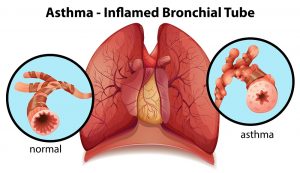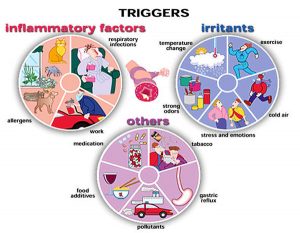If you’ve been recently diagnosed with asthma, it can be overwhelming. We thought it might be helpful to provide you with everything you need to know and understand about your disease. Knowledge is power, and we find that patients who understand their disease feel as though they are more in control and are able to make better health decisions when the time arises.
What is Asthma?
 Asthma is a chronic inflammatory condition of the airways. This inflammation causes the airways to narrow and fill with inflammatory mucus, which leads to shortness of breath, chest tightness, and often chronic cough.
Asthma is a chronic inflammatory condition of the airways. This inflammation causes the airways to narrow and fill with inflammatory mucus, which leads to shortness of breath, chest tightness, and often chronic cough.
What Causes Asthma?
Asthma is often an inherited condition. It is also sometimes triggered by common respiratory infections that affect the lung airways.
Can Asthma be Cured?
No. Asthma is a chronic disease, which most people will have for life. The severity of asthma may vary over time, from no symptoms to mild or moderate symptoms.
What are the Signs & Symptoms?
Common symptoms with asthma may include wheezing, or a whistling sound while breathing out, chest tightness, cough, and difficulty breathing. Uncontrolled asthma often produces nighttime symptoms that can interrupt sleep.
What are “Asthma Triggers” ?
Factors which irritate the airways and cause asthma symptoms are called “asthma triggers.” Some common triggers include:
• Respiratory infection
• Cigarettes smoke
• Allergens
• Emotional stress
• Odors/perfumes/aerosols
• Pet dander
• Exercise
• Cold air
• Air pollution
What Happens During An Asthma Flare‐Up?
Asthma symptoms occur when there is a narrowing of the bronchial tubes, which in turn causes wheezing, cough, shortness of breath, and chest tightness. These symptoms are caused by untreated inflammation, which can lead to the following
- Swelling or “Edema”: The lining of the bronchial tubes swells, expanding inward, making the size of the airway smaller.
- Mucus over secretion: The tissue cells that line the bronchial tubes secrete mucus which can plug the narrowed air passage even further.
- Bronchospasm: The muscles that surround the bronchial tubes tighten and make the airways even smaller.
How Do My Asthma Medications Help?
Medications used to treat asthma can be grouped into two broad categories: Controller and Rescue Medications.
Controller Medications
Anti‐Inflammatory Drugs: Reduce inflammation in the airway lining. They take time to work, and must be used every day to be effective. These medications are called “asthma controllers.” There are two families of controller medications:
- Inhaled steroids (Alvesco, Asmanex, QVAR, Flovent, Pulmicort, and one of the 2 ingredients in Advair, Dulera and Symbicort). These are medications that heal inflammation in the airway. They have been proven to be the most effective way to control chronic asthma.
- Leukotriene Blockers (Singulair, Accolate, Zyflo CR): These medications treat a specific portion of inflammation and are frequently used in combination with inhaled steroids. If asthma is mild, they are sometimes used alone.
- Oral Steroids (Prednisone, Prednisolone, and Medrol): These are short‐term anti‐inflammatory medications (3 – 7 days) that are used when inflammation in the airways is severe and out of control. The aim of these medications is to get rid of the inflammation quickly.

Rescue Medications
Bronchodilators: These medications open the airways by relaxing the muscles surrounding the bronchial tubes.
- Beta‐agonists (Albuterol and Levalbuterol): These should only be used on an “as needed” basis for quick relief of asthma symptoms. These are considered “rescue” inhalers. A well controlled asthmatic should not be using rescue inhalers more than two times per week. If you are, contact your asthma doctor to discuss ways to improve asthma control.
- Anticholinergics (Ipratropium Bromide): These are also used to open the airways (less commonly) and may be taken in conjunction with beta‐agonist inhalers.
How Can I Prevent Asthma Symptoms From Becoming More Severe?
The most important thing you can do to control asthma severity is to take your controller medication every day as
instructed by your doctor.
• Avoid the asthma triggers that may be causing the symptoms.
• Learn to recognize early warning signs.
• Check your peak flow and follow the Asthma Management Plan that your allergist has provided you.
When Do I Call the Doctor’s Office?
Sometimes asthma episodes become more severe despite your best efforts to treat them early. A change or increase in medications or further medical treatment may be needed. Call your doctor’s office or seek medical help if:
• Asthma symptoms continue or worsen despite all the treatment steps that you have taken.
• The medicines are not helping or not lasting as long as they should.
• You have any doubt about the severity of an attack.
Category: Uncategorized


